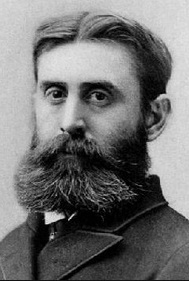The following review was included in the shorter notices section of the Presbyterian and Reformed Review, January 1898, 9:33, on pages 176-77. The section is signed by B. B. Warfield and he was editor of the journal. It is generally accepted that during the run of P&RR, Warfield wrote the shorter notices in his area of studies in polemic-systematic theology; in some cases, he signed his name and in others he did not. From the way the review is written, it appears that Warfield reviewed his own book. Things certainly have changed. Journals I have been acquainted with do not publish authors reviewing their own books, nor do they publish reviews about books written by faculty of the issuing institution. But there is a method in Warfield’s apparent vanity, because he is using the review to respond to a critic of his book.
The issue at hand is the subject of the salvation of infants dying in infancy. The review is not interesting only because Warfield wrote it, but also because his critic held to such an unusual understanding of the salvation of infants. It seems Warfield resorted to the review in P&RR because it gave him the chance to respond to his critic in a timely and direct manner. To me the review reads as though Warfield was more irritated with the critic’s view than he was upset with the criticism of his book. Please see the “Notes” at the end of the review for additional information on Warfield’s view of infant salvation and the Westminster Confession.
Barry Waugh
 Two Studies in the History of Doctrine. Augustine and the Pelagian Controversy: The Development of the Doctrine of Infant Salvation. By Benj. B. Warfield. 8vo, pp. viii, 239. (New York: The Christian Literature Co., 1897.)
Two Studies in the History of Doctrine. Augustine and the Pelagian Controversy: The Development of the Doctrine of Infant Salvation. By Benj. B. Warfield. 8vo, pp. viii, 239. (New York: The Christian Literature Co., 1897.)
The former of the two studies here reprinted was originally prepared as Prolegomena to Augustine’s anti-Pelagian treatises: it consists of an account of Pelagianism; an introduction to each of Augustine’s anti-Pelagian treatises, with abstracts of their contents and illustrations from the Sermons and Letters; and a summary of the doctrine of grace developed in them. The latter of the two studies is a greatly enlarged edition of an essay published some years ago in the Magazine of Christian Literature. It seeks to trace the general drifts of doctrine on the intensely interesting subject with which it deals, and essays to show that on no other than the basis of the Reformed theology can a consistent doctrine of the salvation of all infants dying in infancy be framed. The truth of this conclusion may fairly be considered to be illustrated by a courteously written criticism upon this essay which appeared in The Reformed Church Review (October, 1897, 4th series, Vol., pp. 520-530), apparently from the pen of the editor, the Rev. Prof. William Rupp, D.D. After passing the several opinions under review, Dr. Rupp, rejecting the historical Reformed view, can find no tenable position save in the extension of “the possibility of salvation, or of probation and moral discipline, into the spirit world beyond death.” He adds: “The objection to this theory will be that it does not guarantee the actual salvation of all infants. It assures us, indeed, that no infant is damned at death. But if the fate of a departing infant will depend ultimately upon the decision of its own will in Relation to divine grace, we cannot be certain, here and now, that every infant will be eternally saved. This must, of course, be admitted. The salvation of the dying infant must be supposed to be liable to as much contingency as the salvation of the living one, but to no more.” Here Dr. Rupp places his seal on the entire contention of the essay—which is merely that on the Reformed doctrine alone can there be framed a consistent doctrine of the salvation of all infants dying in infancy; so that, if that doctrine prove to be Scriptural and true, it will become the test of systems, and, in its light, the historical Reformed (i. e., the Calvinistic) doctrine only can live. The best that Dr, Rupp, on a basis other than this doctrine, can offer to bereaved parents is that their infants “beyond the veil ” are as well off as if they had not died: and even this seems, from his own showing, more than he is entitled to offer to them. For he is forced to add: “There is only this difference between living children and those who are no longer living, that for the salvation of the latter parents can do nothing more except pray, although there is a difference of opinion as to the propriety of that.…The Christian training which they can give to their living children, they can no longer give to the dead.” Are not the dead, then, in worse case than the living? And what ground can be suggested for really believing that a greater proportion of children dying in infancy will be saved, than of those living here under their pious parents’ care and made the objects of a prayer about the propriety of which there can be no difference of opinion? Dr. Rupp, indeed, tentatively suggests that parents may “trust that the place of their own care and training will be supplied by the loving service of beings holier and wiser than they, who will not even make the mistakes which they themselves would have been likely to make;” and feels authorized on this suggestion to conclude that “the salvation of dying infants, if not more sure, is at least not less sure, than is that of the living.” It were a pious hope; but it forms scarcely firm enough a basis for this great conclusion. While we are hoping, we may just as well hope that the loving Father will gather all whom He takes out of this world in infancy at once to His bosom. Only, then it would be all up with the “mediating theology” which Dr. Rupp has embraced, with its “ethical” postulates. Only the believer in the Reformed theology, which Dr. Rupp rejects, is entitled to hope that. On the whole and as far as it goes this would seem a commendation of the Reformed theology; and in this feature of it at least there are not very apparent “those elements of hardness and arbitrariness” which, he assures us, cling to the idea of God in that theology.
Princeton,
Benjamin B. Warfield
Notes—The header shows the upper level of the Old Library of Trinity College in Dublin, Ireland. Warfield comments on infant salvation and the Westminster Confession in his book beginning on page 214. Follow the LINK for Warfield’s personal copy of his book with annotations regarding sources. For a clear presentation of infant salvation and death see Chad Van Dixhoorn’s, Confessing the Faith: A Reader’s Guide to the Westminster Confession of Faith, Banner of Truth, 2014, pages 153-55; for a not so clear perspective on the subject, in my opinion, see Francis Beattie, The Presbyterian Standards: An Exposition of the Westminster Confession of Faith and Catechisms, 1896, 194ff, but he may have clarified his comments in later imprints or editions because changing or adding a few here and there would make better sense. Rupp was Professor of Practical Theology in the Theological Seminary of the Reformed Church in the United States.





